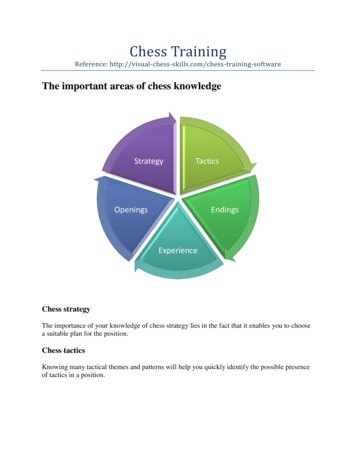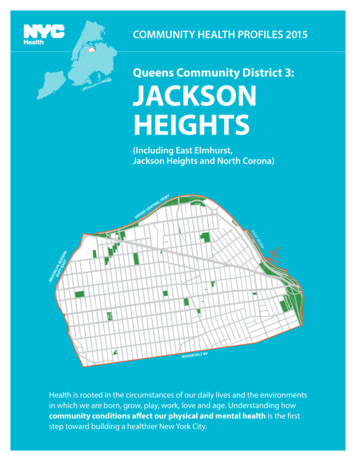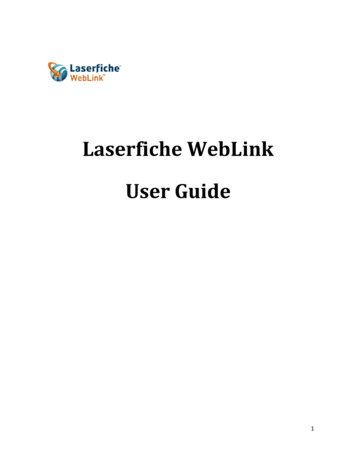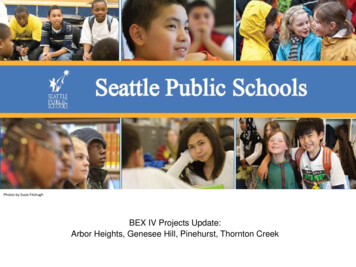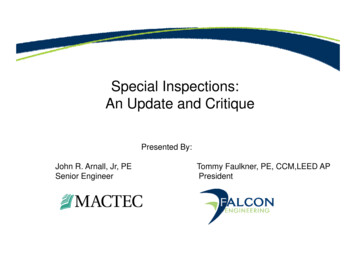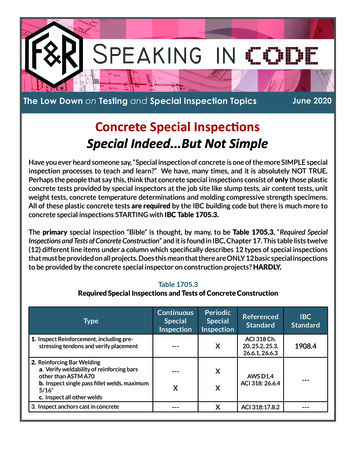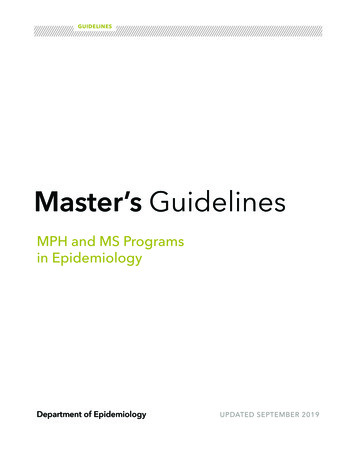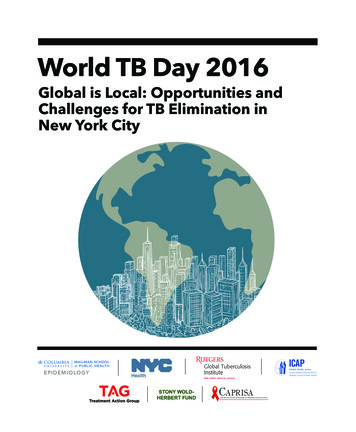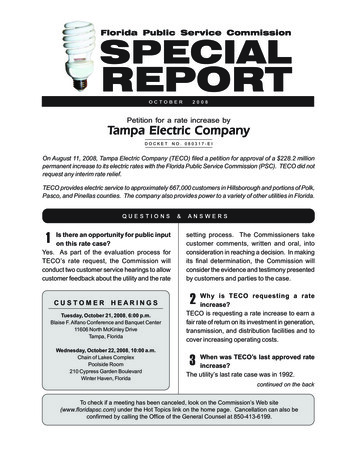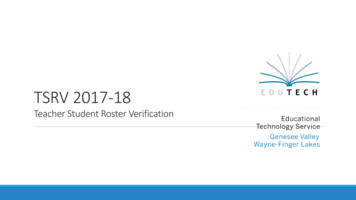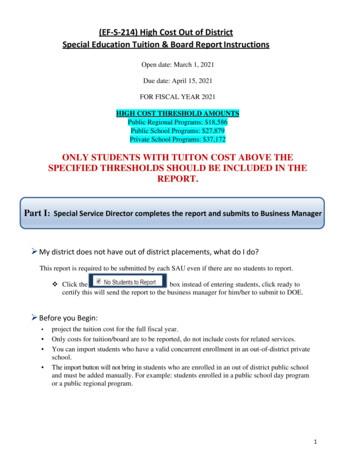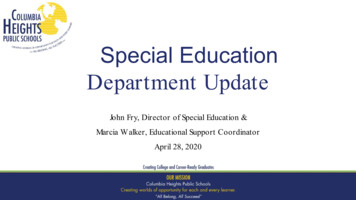
Transcription
Special EducationDepartment UpdateJohn Fry, Director of Special Education &Marcia Walker, Educational Support CoordinatorApril 28, 2020
Purpose of this PresentationThe purpose of this presentation is to share information about updates to thespecial education department. There are no governance questions with thispresentation but rather it is an informational presentation about updates regardingprogramming in the Special Education department.
SPED Department Special Education TeachersEducational AssistantsSchool NursesSchool Social WorkersSchool PsychologistsSpeech & Language Pathologists (SLP)O ccupational Therapists (O T’s)Certified O ccupational TherapyAssistant (CO TA). Physical Therapists (PT’s) Physically/Health Disabled (PHD)Teacher Blind/Vision Impaired (BVI) Teacher Deaf and Hard of Hearing (D/HH)Teachers Vision Teachers O rientation & Mobility Specialist (O & M) Autism Resource Specialist O ut of District Placements Physical Impaired Teacher Developmental & Adaptive PhysicalEducation Teacher (DAPE) Health Services Consultation Services in behavior, mentalhealth and programming. School Based Mental Health Support
Student Supports Support our Students Grant Provides for additional Social Worker at Columbia Academy Alternative Delivery of Specialized Instructional Services (ADSIS) Elementary Reading Interventionists Secondary Check and Connect Specialists Anoka County Children and Family Council (ACCFC) Local Collaborative Time Study (LCTS) Competitive Partnership Grant - FY20 Award provided for ImmunizationClinics and Peer/Family Coaching Services
Immunization Clinics Immunization Clinics - 2nd year Partnership with Neighborhood HealthSource Two Events: September 25, 2019 and O ctober 2, 2019 30 families - 27 families had no insurance, Interpreters provided for 26families 26 vaccines Insurance Assistance - 19 families Dental Referrals - 6 O phthalmology Referrals - 4 Screened for Food Insecurity - 29 families Specialty Health Referrals (ENT, allergist, etc ) - 6
Response to Identified Need Increase MCA scores for students in Special Education across the district. O ur Response: Pilot Research Based Literacy Curriculum to fully implement the pilotin the 2019-2020 School Year. The Impact: Students made significant growth at the elementary level on their FASTBridge Data in Reading. We are looking forward to seeing this growth on stateassessment in 2021.
Response to Identified Need Due Process Updated and Procedural changes provided to Staff which are specific toBest Practices & Compliance. O ur Response: Monthly Newsletter sent to staff followed up by monthly specialeducation staff meetings to provide clarity. The Impact: Monthly staff meetings provided quick access to district guidance andcommunication to staff to ensure consistency of programming and due processprocedures across the district.
Response to Identified Need Completing the Fiscal Compliance requirements for the 2018-2019 school year. O ur Response: Create a plan providing timelines to MDE to ensure completionof the fiscal compliance review by June 29th. The Impact: The Special Education Department also completed our FiscalCompliance 13 Corrective Action Plans (CAP) in June 2019 and are consideredby the state in 100% fiscal compliance.
Response to Identified Need Continuous Staff Development O ur Response: Trained Educational Assistants in “Realizing their Why in theWork they do.” The Impact: Centering EA’s on why they are working with students,increases their engagement and investment in their work with students.
Response to Identified Need Building Relationships with all stakeholders (Parents, teachers, EA’s and thecommunity) O ur Response: Increase communication with our Special Education Advisory Council (SEAC)to broaden parent participation.(Next Meeting: May 4th @ 600-700 PM). Participate in the 2019 Special Education Parent Survey with MDE. Include Itinerant staff in newsletter communications, trainings and monthlymeetings. The Impact: Increased understanding of stakeholders view point and to makechanges to programming from parents advocating and advise.
Academic Instructional Support & Curriculum
Academics Early Childhood Special Education (ECSE)Professional Learning Communities (PLC) Collaborative WorkGO LD- Teaching Strategies & AssessmentCreative Curriculum ImplementationSTAR Curriculum in our Site Based Program @ the Family CenterAutism Navigator training and strategies implementedElementary Professional Learning Communities (PLC) Collaborative Work Sonday system (K-5) Training and Implementation
Academics- What’s new & groovySecondary Professional Learning Communities (PLC) Collaborative Work Life Centered Education (LCE) transition curriculum through the CEC PAES lab start up- Transition Students, 11th & 12th grade students
Behavior Support & Social Emotional Learning
The Heart of Education"The heart of education is the relationship between the student and the teacher.Everything else depends on how productive and successful that relationship is.If that is not working, then the system is not working. If students are not learning,education is not happening"Pages. 71-72- Ken Robinson's (2015)- Creative Schools: The Grassroots Revolutionthat's Transforming Education
Behavior Support & Social Emotional Learning Columbia Heights Public Schools is a Children’s Therapeutic Services andSupports (CTSS) school provider in the Anchor Program. CTSS is a flexible package of mental health services for children who requirevarying therapeutic and rehabilitative levels of intervention. Services include: Diagnostic Assessment Administering and Reporting Functional Assessment Treatment plan Development and Review Psychotherapy (Individual, Group and Family) Skills Training (Individual, Group and Family)
Behavior Support & Social Emotional Learning All, but one, licensed Special Education Staff are certified in non-violent CrisisPrevention Intervention (CPI). We also increased the number of EducationalAssistants who are certified. We piloted the use of the Nurtured Heart at Valley View Victory Program aspart of the Valley View Victory Program Redesign. Educational Assistants were trained in the Nurtured Heart Approach to havea lens for what is going well in each moment with students and to enhance therelationships with the students they work with. Social Emotional Framework and Competencies were introduced to guide IEPgoal development and skills training.
Compliance
Compliance Agenda Used for IEP meetings. Staff utilized tenets from the “Gold Standard IEPMeeting” provided last school year. Licensed staff focused on Standards Based IEP’s for Reading, Math & SELFramework and Competencies for IEP goals. Use of SPED forms increased with the following items: Finalization of ALL Data Sheets and past due process items for students onyour caseload. “Record of Team Meeting” form used and included in students cum files todocument IEP meeting notes. “Use of Restrictive Procedures: Physical Hold” Form and the follow-up “StaffDebriefing Meeting” Form
Compliance During the 2018-2019 school year, we completed our self-review year for dueprocess compliance and successfully completed our Corrective Action Plan(CAP) in the transition planning area. During 2019-2020 school year, we completed the Corrections from the SelfReview. MDE conducted an onsite Facilities Review at the beginning March.
Compliance MDE site visit- 1st week of March. Here is what our compliance monitor noticed: Anchor program, space & staff.Co-Teaching Math & English @ the Secondary level.PAES lab space.DCD spaces with sensory spaces with good visuals.Autism Navigator, STAR curriculum & Sonday Curriculum use and implementation.Victory Program physical space, unique furniture for students, academics werehappening (learning was happening) and the repurposing of the seclusion room into asensory space with great visuals. Restrictive Procedures Data trending down the last 2 years. Staff positively collaborating and sharing resources. MDE’s final report of findings has not been shared at this time and will be made publicwhen completed.
ABC’s for 2019-2020---Academic Instructional Support & CurriculumBehavior Support & Social Emotional LearningC ompliance Supports & Consistent Systems to use and develop
What areas are we still growing in? Academic: Expand STAR curriculum with ECSE students. Continue to support implementation of the Sonday Literacy program at theElementary level. Expand curriculum options for Literacy at the Secondary level (6-12). This mayinclude piloting Sonday Curriculum or another research based program for studentswith disabilities. Consult & Collaborate with Intermediate 916 on program design and best practicesfor high school students with disabilities. Expand Assistive Technology to increase communication for students using,Augmentative and Alternative Communication (AAC).
What areas are we still growing in? Behavior and SEL: Maintain continuity within the Anchor program to increase consistency for students. Social Emotional Learning (SEL) framework and competencies expanded use withinstudents IEP’s. Increase support for teachers from Behavior/ASD specialists. Expansion of the Victory Program Redesign work at CA.
What areas are we still growing in? Compliance Training and professional development provided per MDE’s recommendationsfrom their final report. Collaboration with Teaching and Learning regarding due process support for 1st& 2nd year teachers. Increase support for licensed staff on due process paperwork workflow.
Thank you
Pages. 71-72- Ken Robinson's (2015)- Creative Schools: The Grassroots Revolution that's Transforming Education. B ehavior Support & Social Emotional Learning Columbia Heights Public Schools i

